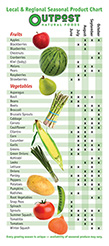Keeping Produce Fresh

The Crisper Drawer
Stop storing your produce in plastic bags and get reacquainted with crisper drawers!
There is a very real purpose for the crisper drawers in your fridge besides keeping all those little yogurt containers in one spot. Usage can actually help prolong the shelf life of your fresh produce AND help you kick the plastic produce bag storage habit altogether.
As a general rule, don't store fruits and vegetables together in the same drawer or container. Why? Both fruits and veggies give off ethylene gas, a type of hormone that helps with the ripening process. Fruits typically give off more of the gas than vegetables. When stored together, fruits can actually hasten the ripening of vegetables. This can lead to early spoilage. Keeping the two groups separate is the first key step.
Fruits | Open Vented Crisper Drawer
Fruits naturally emit ethylene gas when stored. Storing them in the crisper drawer with the vent OPEN allows for those gases to escape. Adjusting the vent can help better control the humidity level.
Example: Apples, peaches, pears, plums, grapes, honey dew melon, apricots, kiwi, papayas, cranberries, berries
PRO TIP: Pears, avocados and stone fruits (peaches, plums, apricots, nectarines, etc.) will ripen nicely if kept on the counter for a few days in a brown paper bag. Check for ripeness and then enjoy!
Vegetables | Closed Vented Crisper Drawer
Vegetables generally are more sensitive to ethylene gas and tend to do better in a closed environment. Store these items in the crisper drawer with the vent CLOSED or in the drawer that has NO VENT.
Example: Green leafy vegetables, cruciferous veggies like broccoli, carrots, cucumbers, peppers, fresh herbs, citrus, eggplant, green beens, asparagus, cut onions, fresh woody herbs like sage, thyme or oregano
PRO TIPS:
Keep tomatoes on the counter and not in the fridge.
Leafy herbs such as parsley, cilantro or basil may benefit stored upright on a shelf in a glass of water - like a small bouquet. However, keeping them in a small closed container will work as well.
Loose greens such as spinach and some lettuce will do well in a smaller closed container.
Non-refrigerated storage
Good news! Not everything needs to go in the fridge.
Bananas, avocados, melons, mangoes, tomatoes will continue to ripen when left out on the counter. Eat within a few days of purchase, or transfer to the refrigerator once ripened to slow the process.
Garlic, onions, potatoes, sweet potatoes and winter squash store well in a cool, dark, ventilated location, like a cellar or a part of your kitchen that is out of the sunlight.
Additional storage tips
- Check your produce daily, especially those left out to ripen
- Don't wash produce until it's time to eat or use in a recipe
- Give Plastic the Boot for your Veggies & Fruit!








